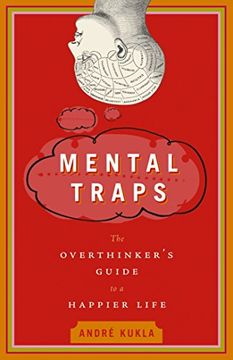Reseña del libro "Mental Traps: The Overthinker's Guide to a Happier Life (en Inglés)"
Mental Traps is André Kukla’s immensely enjoyable and down-to-earth catalogue of the everyday blunders we make in our thinking habits, how these traps can affect our entire lives, and what we can do about it.Ever find yourself putting off even relatively minor tasks because of the many other little jobs that you’d have to tackle first? Or spending far too much time worrying about things you can’t change? Or living for the future, not for today? Truth is, we all do — and we all recognize that sometimes our ways of thinking just aren’t productive. When it comes to our daily lives, we often laugh off habits like procrastination as being human nature and just resolve to approach things differently next time. Or, when the issues facing us are enormous or traumatic, we might recognize that we’re dwelling on our problems, or otherwise spending our time on fruitless thinking, but have no idea how to get out of that miserable rut. Either way, it takes up a lot of our mental energy.But as André Kukla makes clear in Mental Traps, what we don’t recognize — or at least admit to ourselves! — is how thinking unproductively about even the smallest elements of everyday life can mount up and keep us from being happy, from living life to the fullest. For what appear to be minor lapses are actually “habitual modes of thinking that disturb our ease, waste enormous amounts of our time, and deplete our energy without accomplishing anything of value for us or anyone else.” So whether we’re dealing with how to attain our major career goals or deciding when to serve the salad course at dinnertime, the end results can be much the same: readily identifiable patterns of wasteful thinking. These, in Kukla’s view, are the mental traps.In his introduction, Kukla compares his method to that of naturalist’s guides, which take a very matter-of-fact approach to providing practical information. He then outlines eleven common mental traps, such as persistence, fixation, acceleration, procrastination and regulation. Devoting a chapter to each, he provides simple examples to help us to identify mental traps in our own thinking — and to recognize why it would be beneficial to change our ways. Our anxiety, our dissatisfaction, our disappointment — these are often the consequences of thinking about the world the wrong way. And it’s in the parallels he draws between the major and minor events of our lives that he truly brings his point home: How is refusing to eat olives like toiling at a job that has long ago lost all satisfaction? How is arriving at the airport too early a symptom of a life never fully lived? Again, what can seem to be a very inconsequential habit can actually signal bigger, more detrimental problems in our ways of thinking.Kukla’s goal — one that we should share, in the end — is to help us realize how much more enjoyable our lives would be if we were a little more attentive to our thought processes. Just as Buddhism, from which the author has drawn many of his ideas, teaches that we should perform all of our acts mindfully, Kukla suggests that we make a conscious effort to step back, clear our minds, and simply observe how our thoughts develop. By doing so, we will begin to recognize unproductive patterns in our own thinking, and then we can try to avoid them. Ultimately, Kukla hopes that Mental Traps will help readers move towards what he calls a “liberated consciousness” — a state in which we no longer allow mental traps to inhibit our experiences. From having more energy to being able to act impulsively, we’d realize the benefits of living in the moment and feel truly free.

